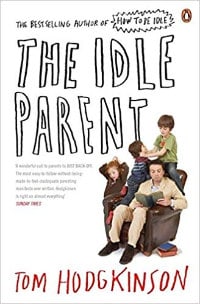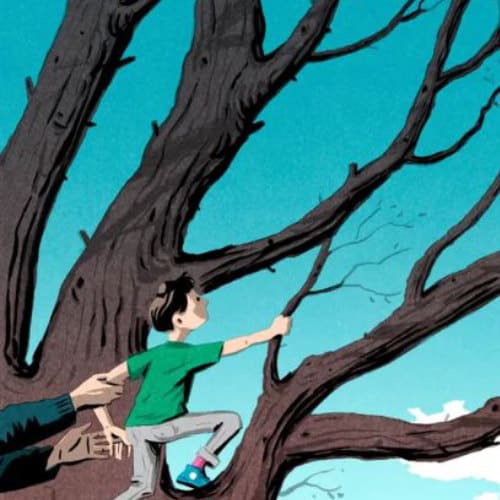An interesting article in the Guardian led me to think about how much I see parents ‘do’ for their children today – compared with when I started teaching in 1996. (I include myself, as a mum, in this potentially offensive statement – but if we do not talk about the subject of ‘mollycoddling’ then we cannot help move things forward).
Have a read of the article and see what you think? Where do you stand on these discussion points?
We are so keen to help our children. To assist our offspring. To heal things for them immediately. To find a quick fix. To shelter them from failure. To protect them from danger. To stop them feeling upset. I wonder if we are in fact harming them through this suggested ‘mollycoddling’.
 Here is another favourite read. The Idle Parent by Tom Hodgkinson:
Here is another favourite read. The Idle Parent by Tom Hodgkinson:
https://www.goodreads.com/book/show/7124706-the-idle-parent
He says:
Children develop by … ‘Being loved but being free.’
He advises parents to … ‘Do less!’
He claims … ‘Passive parenting is responsible parenting.’
My gut is that he is right. Deep down I know that we are indeed not helping our children get ready for their future by helicoptering above them at all times. Note to self to stop doing this.
I shared the article with Mrs Anna Bruce-Jones and asked her opinions on how she felt about the links being found between children’s early experience of independence and their later mental health. She has
developed an independence charter with the other Early Years staff and had much to say on the topic. See below.
Lucy Ball
 As a parent you want to take every bit of pain away from your child, whether physical, mental or emotional.
As a parent you want to take every bit of pain away from your child, whether physical, mental or emotional.
However…
My daughter is now 22 and is living in London and embarking on a career in which she will have to be extremely resilient. Has my parenting given my daughter the skills and attitudes to cope with life? Oh, I hope so. Will she become one of the many young adults who succumb to great sadness and anxiety? I desperately hope not.
With the rise in young people who feel sad or unable to cope with life, I truly believe that we need to try to IMMUNISE our children against life’s disappointments just as we immunise them against diseases. How do we do this?
We need to build:
INDEPENDENCE; SELF-ESTEEM; SELF-BELIEF (NOT always worried about what other people think); RESILIENCE; PERSEVERANCE; ABILITY TO STRUGGLE; a CAN-DO ATTITUDE to CHALLENGE; a sense of CONTENTMENT (as opposed to wild excitement and happiness – which is what many young people think life should be about).
How? Well, here are 10 ideas for you to consider (some controversial!):
“Never do for a child ANYTHING they can do for themselves”. Every time you are about to do something for your child, STOP! Ask them to do it. Asking children to do things themselves says (without words): “I trust you”; “I believe in you”; “I have high expectations of you”; “I don’t care if you mess up – life’s full of messing up on the way to success”. “You need to keep going with this – it will come eventually”. DON’T INTERFERE if things go awry. That’s life. Just get them to do things for themselves. Make it a habit you start today.
Praise, but STOP OVER-PRAISING. Say: “Well done”; “Good”; “Thank you”, etc. But STOP before you say “Amazing!” “Wow!”, etc. Why? 1. You don’t get “Wow!” etc when you are an adult (well, not very often!) so of course young people feel depressed when they stop hearing “Wow!” when they’ve heard it all their childhood. 2. It becomes meaningless. 3. Your child feels that YOUR opinion (and the opinion of others) is all that matters. What should matter is their OWN opinion – to build self-belief. 4. It teaches children always to crave praise from others.
Let’s stop Social Media ruining any more lives: if children grow up being shown that other people’s opinions (about what they have done and how they look) are NOT IMPORTANT, we will have done a great job.
Ask children to think about/ praise themselves. If a child asks “What do you think of my drawing?”, say “What do YOU think of your drawing? That’s what matters most”.
Say “You should feel proud of yourself” NOT “I am proud of you”. A subtle but very important difference.
Be SPECIFIC with praise, then always throw it back to their opinion: “That part has very neat colouring. What do you think is the best part?”
Eliminate “For me”. Don’t say “Could you lay the table FOR ME?” Just say “Could you lay the table, please?”. The first one is a type of emotional blackmail. Again, we must try to stop children always craving praise from others or doing things because it’s a favour. It’s just life. Fast forward 10/20 years and a boss says “You need to… NOW”. You want your child to think “Of course. I’ve been asked to do things hundreds of times before” Rather than question it or throw a tantrum or sink into a sad state.
Rewards vs consequences. We have a generation of children who expect rewards for behaviour and achievements. Sadly, adult life is not always like that! So no wonder young adults feel sad about life. Rewards generally should be for actions over and above the norm. Don’t feel you are a bad parent for offering negative consequences whenever appropriate. Say in a calm, matter of fact voice (not cross or whinging!) “Please do your prep or we won’t be able to go swimming tomorrow”. “Please stop being unkind to your sister or I won’t take you to the party on Saturday”.
Saying “No”. Oh gosh, we feel saying “No” to our children is going to make them distraught, don’t we? Or if we do say it, we ramble on and on about why the answer is “No”. You will be building your child’s resilience by simply saying “No” to some requests. No explanation. It’s just your decision as a good parent. Take your child forward 10/20 years. No big deal if they hear “No”. RESULT!
Don’t make a big deal if your child is upset. Empathise. Cuddle. Move on. Can you imagine adult life if you’ve never had to deal with being sad? We would never make our children deliberately sad, but we all need to get our children used to disappointment because they need to feel it’s no big deal when they are older – “ Sad? Meh. Big deal. Been there, done that. Got over it.”
Contentment: please do not feel that you have to make your child’s life wildly exciting. What happens in 10/20 years’ time when parts of life are pretty darn dull? They will feel sad. Get your child used to contentment and finding enjoyment in small things.
Please remember you are a PARENT, not a pack-horse or servant or taxi service or waiter or restaurant manager or even their best friend (that will come later IF you have done a good job – including making unpopular decisions).
Every time you do something to build your child’s immunity against life’s challenges, tell yourself what a loving parent you are! Your reward will be a child who can cope – and THRIVE – as an adult.
Lastly, with my daughter firmly in mind (and my fingers crossed I had done a good job as a parent) , I found this video eye-opening:
Anna Bruce-Jones






 As a parent you want to take every bit of pain away from your child, whether physical, mental or emotional.
As a parent you want to take every bit of pain away from your child, whether physical, mental or emotional.

